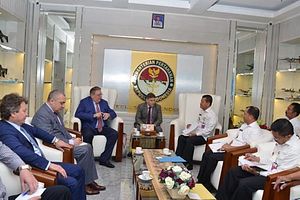Last week, Indonesia concluded yet another deal for military equipment from Russia. The deal reinforces Jakarta’s continued efforts to cultivate Moscow as one of several partners as it builds up its military capabilities, in spite of the various challenges that remain for the defense relationship.
Russia is one of several partners Indonesia is looking to as it builds the capacity of its military. Though there are a range of defense-related interactions between the two sides, including exchanges and dialogues as well as discussions on issues such as technology transfer, military equipment purchases have been a key aspect of ties as well. While some form of defense collaboration has been going on since the midst of the Cold War, ties with respect to arms sales intensified particularly in the 1990s and the early 2000s, and have included armored personnel carriers, infantry fighting vehicles, assault rifles, planes, and helicopters.
Last week, the defense aspect of the relationship was in the headlines again with news that the Indonesian defense ministry had acquired more military equipment from Russia. The Indonesian defense ministry (MoD) signed a contract for acquisition with Russia’s JSC Rosoboronexport, which is part of the Rostec State Corporation, at the MoD’s defense acquisition office in Jakarta on April 22.
Per the Indonesian defense ministry, the contract consisted of 21 BT-3F amphibious armored personnel carriers (APCs) for $67.2 million and 22 BMP-3F infantry fighting vehicles (IFVs) for the country’s Marine Corps (Korps Marinir or KORMAR) for $108 million, with procurement partly funded from loans as part of ongoing modernization plans tied to the Minimum Essential Force (MEF). The contract was inked by representatives from MoD and Rostec.
The new acquisitions reinforce the role Russia continues to play in building the capacity of Indonesia’s military. The BT-3F amphibious vehicles purchase is of particular note, since this is the first batch that Indonesia is acquiring and Jakarta is in fact the first export customer for the BT-3F. The acquisition of the BT-3F, which is designed for the transportation of forces and fire support for combat operations, comes after years of consideration, with reports of Indonesian military officers witnessing demonstrations of its capabilities back in 2017. Per Rostec, notable features of the BT-3F include energy-absorbing folding chairs to reduce shock loads, tele-thermal imaging sight and a laser rangefinder for monitoring terrain, and a high level of unification to reduce expenses and personnel training costs.
Despite the ongoing collaboration between the two sides, they both have to navigate various challenges in order to further their relationship. For instance, both the secretary general of Indonesia’s defense ministry and Rostec’s chief publicly noted the scrutiny Jakarta has been applying to terms on areas such as the extent of involvement of its domestic defense industry, the transfer of technology in the building of broader industrial partnerships, and delivery timelines. Such issues have delayed and at times prevented other deals between Russia and Indonesia from going through, and both countries continue to work to manage them moving forward.






























